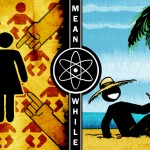Each Friday in Not Fit for Dinner, C. Ryan Knight explores political issues and the preconceptions guiding our understanding of and responses to them.
Rick Santorum interviewed last week with RealClearReligion and discussed his faith. His answers adhered to the scripted line of evangelical politicians: his faith and conscience, rooted as they allegedly are in Scripture, direct his policies.
Based on Santorum’s answer, the interviewer asked if Santorum’s faith would confirm that war with Iran would be categorized as a just war. Here is Santorum’s answer:
“I think when someone is preparing a nuclear weapon and is speaking about wiping out another country . . . you have an obligation to stop a grave harm from being done. I’ve been all about trying to prevent a war in Iran, because I think if Iran gets a nuclear weapon there will be a very, very sad chapter in human history . . .”
Well, then—that’s settled. Or so such a rhetorical gesture would have us wrongly think.
Much of what Santorum says is unproved, misleading, or erroneous. It’s a stretch to say Iran is planning terrorist attacks around the world when he most likely has in mind only the U.S. and Israel. Santorum refuses to pursue negotiation with Iran, so he will have to “prevent a war in Iran” by starting a war against Iran through a blitzkrieg—a glaring contradiction. And let us not neglect that this, too, would be a very, very sad chapter in human history, as with Iraq.
Santorum’s approach to Iran is based in a double-punch combo: the hyped-up claims of Iran’s saber-rattling and the equally exaggerated doomsday claims from groups like the American Israel Public Affairs Committee (AIPAC), which claims Iran is “racing toward a nuclear weapons capability”—an unproven claim that not even the worried International Atomic Energy Agency (IAEA), the world’s nuclear watchdog, can make with certainty.
Iran may simply be saber-rattling to prove itself a formidable sovereign nation as various nations speak to it condescendingly. Iran’s Supreme Leader Ayatollah Ali Khamenei has not publicly ordered the production of nuclear weapons. Thus, preventive action against Iran would be a violation of international law. David Albright, president of the Institute for Science and International Security, has said nuclear capability does not necessarily mean Iran has decided to build a nuclear bomb.
We should not tacitly accept calls to violate international law and commit an act of aggression (a crime barely outside the International Criminal Court’s jurisdiction to prosecute) under the doctrine of preventive war, leading to scores of civilian deaths. As some have pointed out, civilian deaths are bound to be unacceptably high. At any rate, you need enough civilians to survive to make good the dubious claim made by various politicians that America is spreading democracy.
Furthermore, politicians like Santorum should be very careful when making the claim that their faith directs their foreign policy. If all we had were the Old Testament to direct foreign policy, perhaps there might not be such a danger. Yet Christ’s peaceful dealings with his political enemies begin a new chapter of handling major disputes. The sword he brings (Matthew 10.34) is metaphorical, not literal. That Christ told Peter to re-sheath his sword should make Christians hesitant, if not unwilling, to attack others.
Santorum’s faith may be sound, but sound faith does not guarantee sound reason in foreign policy. It’s well to note that much of his “reason” is tied to hawkish claims, seen for instance when scholar Matthew Kroenig claims that a nuclear-armed Iran limits American responses, which is unacceptable because it would force “Washington to think twice before acting in the region.” Since when, by the way, is thinking twice unwise?
Such claims about imminent disaster feverishly beat the war drum. Reason should carefully probe and resist fanfare. Take, for example, scholar Colin H. Kahl’s rebuttal to Kroenig, where Kahl explains that it would take Iran at least a year after achieving weapons-grade uranium for a nuclear weapon to be successfully made. Furthermore, Iran’s nuclear weapons are far more likely be deterrents against aggression rather than weapons to be deployed.
I’ve argued elsewhere that alternate courses of action should be pursued. Let’s hope Santorum–and many others–rethink the consequences of launching preventive and premature war against Iran over nuclear weapons.











